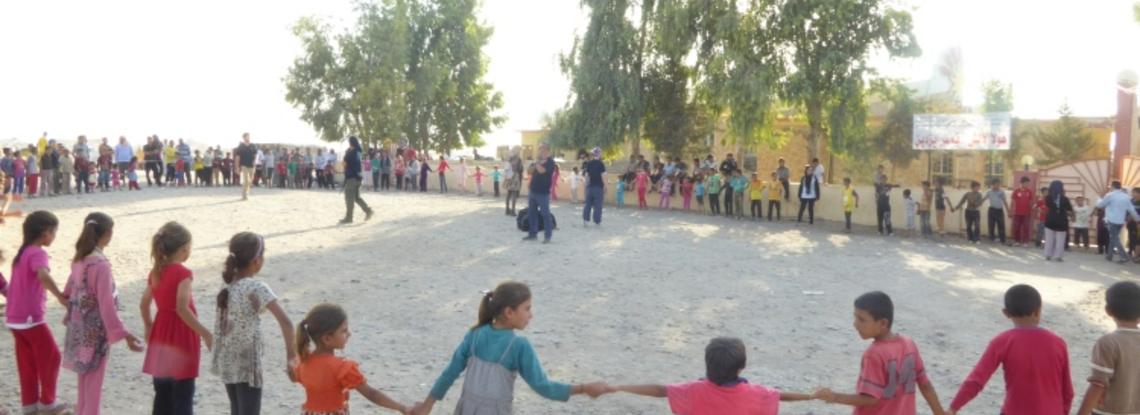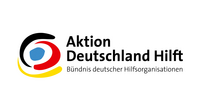Kurdistan-Iraq August 2014
Childhood in a State of Emergency

Emergency Pedagogy for internally displaced Iraqis
On top of houses in captured villages and towns their black flags wave. Within just a few days the militia of the Sunni jihadist group “Islamic State” (ISIS) captured wide areas with Yazidi and Christian settlements. Forced displacement, kidnapping and mass executions followed their occupation. The terror regime of the ISIS jihadists forced thousands of people to flee. After days of forced marches many refugees arrive at the Kurdish provincial capital Dohuk in the Autonomous Region of Kurdistan in Iraq. Here, the refugees live in jostling emergency quarters: About 800 schools and cultural centres, countless building shells, makeshift tent cities, and emergency accommodations along the road provide shelter for the refugees. Few refugees have more than a small plastic bag of belongings with them. More than half of them are children- and all are deeply traumatised by their experiences.
Emergency Pedagogy helps to overcome traumatic blockades
Since late 2013, the Friends of Waldorf Education have been cooperating with UNHCR, the United Nations High Commissioner for Refugees, in order to support Syrian refugees in northern Iraq. As a result of the current flow of internally displaced Iraqis, the Friends carried out an Emergency Pedagogic aid mission from August 21st to September 3rd 2014. Around 1,500 Yazidi and Christian children in the Dohuk region received help. Emergency Pedagogy aims at assisting traumatised children to resolve their trauma-induced paralysation and to process their experiences through the use of Waldorf Educational methods.
The development of trauma-induced dysfunctions is counteracted by the activation and reformation of self-healing powers. Artistic activities open a path to expressing and processing traumatic experiences in a non verbal way. Movement games help to gently diffuse the shock, which literally frightened the life out of paralysed children. Therapeutic handcraft, such as finger-games and string figures work against the trauma-induced feelings of helplessness through an experience of self-purpose and self-control.1
At the school Blend in Dohuk the emergency pedagogues meet seven-year old Jasmin2 from the village Sujar. Ever since her family fled their home, she is continually alert, suffers from panic attacks and nightmares, she stopped playing with other children and is totally withdrawn. Most of the time, Jasmin is huddled up under a blanket in the dark classroom which she now inhabits with her family. She refuses to join our activities. When emergency pedagogues enter the room after her uncle asked them to, the girl panics. The pedagogues immediately retreat because they don’t want to disturb the child’s sense of security which the room provides to her. They ask Jasmin’s mother to gently lead the child from the room and to watch the felting activities together with her. After a while, a pedagogue approaches the still frightfully huddled child and offers her some of the felt, which Jasmin rolls into a ball. Her movements are slow and timid. While she engages in this activity, her body language changes: her posture and her facial expression become noticeably relaxed. Soon after this encounter she leaves the arms of her mother and integrates herself into the circle of children. She even takes the centre and sings a song. With a bright face she rejoins the circle und her beaming smile is reflected in the faces of the mothers surrounding the children. Joy has healing powers.
Traumatised children need safe places
Khanke is a small village close to the Mosul Dam, about a half hour car-ride away from Dohuk in the direction of Seemel. On the outskirts of the village, a provisional emergency quarter has formed in which about 5,000 refugees live. For two weeks the Kurdish vendor Ali Zdin, who lives across from the camp, has kept it running on his own accord. He organised tents because the five UNHCR tents wouldn’t suffice, and he feeds people with three tons of rice per day. Every day, water is transported to the camp. It is just enough water for the people to drink, but not enough for hygienic purposes or to wash clothes. There are no toilets. Two days ago two doctors arrived to look after the many ill and wounded people. Ali Zdin is not the only private person to offer this kind of help. The aid and solidarity for refugees through the initiative of civilians is overwhelming. This is the only reason why a humanitarian catastrophe is averted from this region.
As all victims of traumatising events, the more than 2,500 child-refugees in Khanke need secure and sheltered places to process their traumata. These secure places include external and internal zones, and also their own body. Without basic security, traumatic experiences cannot be overcome.
The emergency pedagogy crisis-intervention team established a Child Friendly Space on an open field, at which about 800 children and adolescents per day find relief. The work is carried out in the open field, where the temperatures rise to a peak of 45 degrees. For the intervention’s duration this place is fenced off and cleaned. Each day of the emergency pedagogic intervention starts with a communal morning circle, in which rhythmical games are played, songs are sung, and a reflective verse is recited. Then 8 workshops with more than 100 participants per group are carried out. At the end of the day, the groups rejoin and form a fare-well circle, which is carried out in the reverse order of the morning circle. Countless adults crowd around the fenced area and thus form another protective area for the children’s activities. Many of the adults take part in the pedagogic work: they paint, they felt, and perform rhythmic actions, just like their children do. The parents are just as traumatised and need help just as much.
A local network for emergency pedagogic first aid
The many trauma pedagogy activities are supported by local colleagues, who received theoretical and practical training in emergency pedagogy and traumatology. The Friends of Waldorf Education support the local emergency response team in continuing their work in the Dohuk region.
Bernd Ruf
Annotations:
The Emergency Pedagogic crisis intervention team included: Stefanie Allon-Grob (early childhood educator), Lydia Behrend (paramedic), Zoe Besand (early childhood educator), Siri Hauser (coordinator), Dr. Bärbel Irion (doctor, therapist), Irina Jankowski (Waldorf educator, arts therapist), Elisabeth Mall (pedagogical assistant), Lukas Mall (coordinator), Jörg Merzenich (curative educator), Reinaldo Nascimento (Waldorf educator, experiential educator), Bernd Ruf (head of mission, special educations teacher), Caspar Schwedes (experiential educator).
1. Niemeijer, M. (2011): Diagnostik. In: Niemeijer, M. et al. (2011): Entwicklungsstörungen bei Kindern und Jugendlichen. Medizinisch-Pädagogische Begleitung und Behandlung. Dornach. 77-101.
2. All names changed by the author.
We would like to thank the ministry for education of the regional government of the autonomous region Kurdistan-Iraq, the representatives of the regional government of the autonomous region Kurdistan-Iraq in Berlin, the Foreign Office of the Federal Republic Germany, the Friends of Waldorf Education’s representative in Northern Iraq, Nesreen Bawari, all Kurdish volunteers, who supported our work, as well as the German Relief Coalition “Aktion Deutschland Hilft”.
We would also like to thank all donors, who made it possible to provide Emergency Pedagogic first aid in Iraq.


